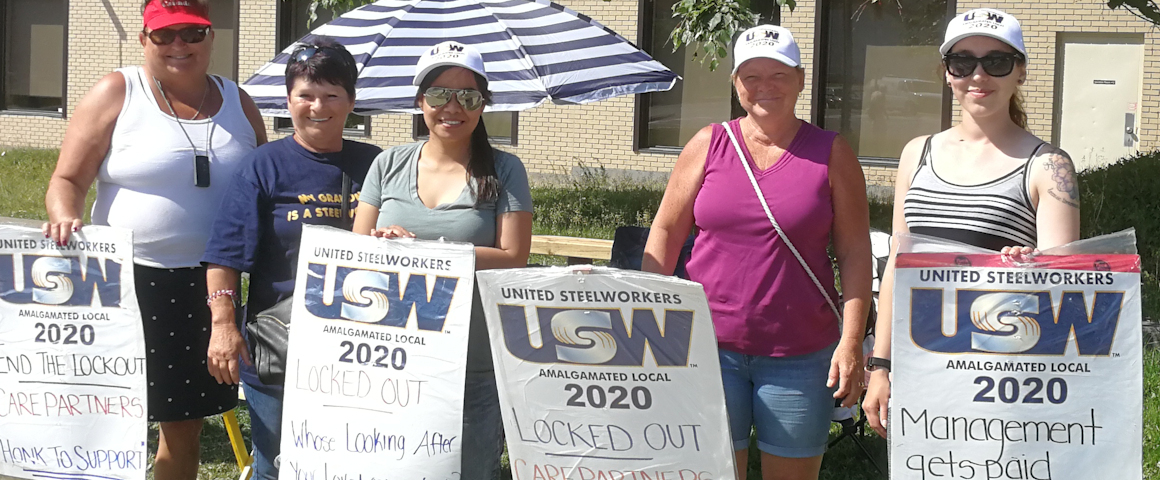Doug Ford’s popularity has risen over the past few months, mainly because his brutal policy of cutting social programs and funding for needy communities has been hidden by the provincial response to the pandemic. Recently, the Ontario government brought in changes to the Employment Standards Act to please the business community at the expense of working people. They have also reintroduced Bill 175, The Connecting People to Home and Community Care Act, that was delayed by the pandemic and which will continue to consolidate the privatization of home care.
Ford may have won some supporters by getting upset about the same things that we all did – deaths in long-term care homes, price-gouging, yahoos protesting social distancing – but working people will not be deceived by style over substance. Ford and his Tory government are moving forward with a legislative agenda that will increase profits for their business buddies by worsening the care standards for the elderly and disabled and lowering wages, benefits and safety conditions for working people.
At the end of May, the government modified regulations in the Employment Standards Act to allow employers in non-unionized workplaces to skip paying workers severance pay after a 13-week layoff. Under previous regulations, workers on a temporary layoff after 13 weeks would be considered terminated and would be entitled to termination and/or severance pay. The government’s changes are retroactive to March 1 and will stay in effect until six weeks after the provincial state of emergency ends. Workers so effected will be deemed to be on “Infectious Disease Emergency Leave.” The new regulations will strip workers of the much-needed one-time boost in pay to help them make ends meet and supplement other possible pandemic benefits. The federal government’s Canadian Emergency Relief Benefit (CERB) only lasts 16 weeks and workers may face exhausting it while still being on layoff without any severance.
The government’s modification of the regulations was in response to concerns from business interests such as the Ontario Chamber of Commerce, the Canadian Federation of Independent Business and the Canadian Manufacturers and Exporters. Businesses have praised the new regulations, stating that severance payouts may have placed them in bankruptcy. For many, the regulations will just delay their final declarations, at which time, workers will be at the end of the line of claimants – and lose their right to claim any wages or severance payments that are owed to them. Over two million people in the province have been affected by the shutdown: an estimated 1.1 million workers have lost their jobs, and another 1.1 million have seen their hours sharply reduced. Under the bogus claim that employers don’t want to terminate their employees, Ford has enabled them to push workers into a limbo where they may no longer claim what they are owed.
The Ford government also recently announced that it is resurrecting Bill 175, which was postponed when the pandemic hit in March. The bill will enable further privatization of homecare services and eliminate the last vestiges of public control and accountability in the sector. It is unconscionable that the government is moving ahead to fortress the privatization of homecare services, given the results of privatization amid the COVID-19 pandemic. Residents of privatized long-term care homes were four times more likely to die from the coronavirus than those in publicly run municipal homes.
The new legislation further entrenches oversight by the super agency Ontario Health, an unaccountable body that is infested with the private sector. The province’s 14 Local Health Integration Networks (LHINs) will be replaced with newly formed Ontario Health Teams which are overly represented by for-profit agencies. These new teams will be overseen by Ontario Health, whose board is populated by many of the for-profit lobby groups that have influenced elder care policy since the Mike Harris Conservatives were first elected in 1995. Private, for-profit homecare agencies will be the big winners in the Bill 175 lottery. The losers once again will be the most vulnerable. Elderly clientele will be the recipients of fewer services with little or no recourse for missed visits. The workers in the sector, mostly personal support workers (PSWs) whose wages are already the lowest in the sector, will be maintained in low hourly-waged work without compensation for travel time between clients, pushing them further into the gig economy that has failed workers so dramatically during the current pandemic.
In addition, Bill 175 will enact procedures allowing Ford’s and all future governments to rule from the back rooms while at the beck and call of their friends, the private operators. The bill will allow Cabinet to change regulations without voting in the Legislature. The Bill of Rights for home and community care clients will be repealed and replaced with only the promise of a new one. However, the new bill of rights will be entrenched in regulation, making it subject to change by cabinet without any public consultation whatsoever.
Natalie Mehra, Executive Director of the Ontario Health Coalition, states this legislation is “being railroaded through at break-neck speed before the vast majority of the more than 750,000 people impacted even know that it is happening. This is poor policy that benefits private interests seeking to increase their market share or their profit margins, but it does not serve the public interest.”
Public hearings will be held before Bill 175 is debated for two days ending June 23, after which time it is expected to be immediately called for third reading. Ford is hoping to ram through this legislation that will have more tragic impacts on Ontario’s vulnerable populations, while people are still concentrating on surviving the pandemic.
Which virus is more deadly – COVID-19 or privatization?
[hr gap=”10″]
Support socialist media!
If you found this article useful, please consider donating to People’s Voice.
We are 100% reader-supported, with no corporate or government funding.




